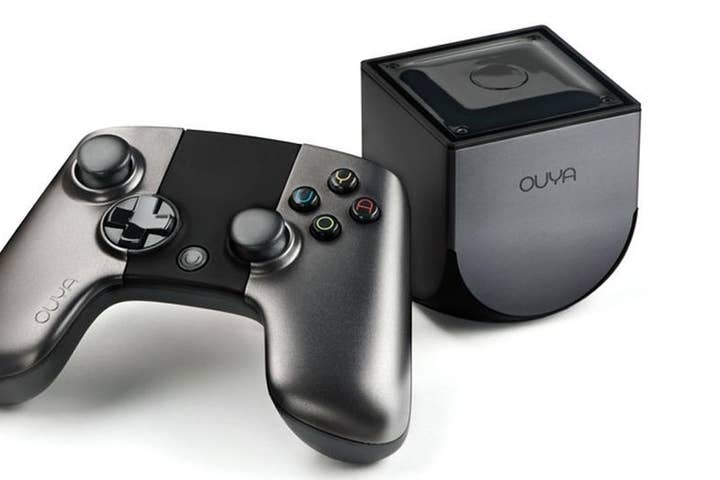How I Stopped Worrying and Learned To Love The Microconsole
Will Luton laughed at the Android microconsoles. Now he's loved-up
The day Ouya's Kickstarter was announced I was sat in a backstreet Brighton pub with some UK indie scene luminaries. "This is bullshit," said one noted writer, "they can't build a console on that little money." To this group the Ouya was at least naïve over ambitious or at most a scam of bluster - the next Phantom. "Do they know how much a console controller costs to R&D?" I didn't. "Millions," he said.
"The notion that some upstart could come along and crowdsource cash on nothing but a video and a promise has gone from absurd to mundane"
Up to only twelve months ago, creating consoles was seemingly the preserve of the richest of the mega corporations. The notion that some upstart could come along and crowdsource cash on nothing but a video and a promise has gone from absurd to laughably mundane.
Yet, what to me was incongruous was never the ambition of Ouya, but its aim: to create a console in an age when the idea of a dedicated machine seemed backwards, the antithesis of progress. I'd like to share with you how I changed my mind, but first why I thought the microconsoles were doomed to falter and fail.
What has happened in the last 10 years in games is a huge cultural and business shift: games have become a part of mainstream culture as TV and music, by no longer being just for gamers. Until around 2007, games were only for those so certain that they wanted to play that they went out and dropped hundreds of pounds on the required accoutrement.
Yet smart phones and the social web are platforms that most people had acquired not for games, but found games once they were there. These are stealth platforms and the revenue and mindshare they are generating is enormous, even pulling developers and players away from consoles.
This lead many to compare consoles to high-end hifi equipment - something for the aficionado minority, willing to spend high sums to get the fullest experience. Whilst I don't know if that fits with the business model, it's a great analogy.
"Consoles simply don't give your average independent newcomer - the next Mojang or Rovio - fair access"
The microconsoles meanwhile, straddle a strange gap: underpowered mobile hardware, running ports of mobile games but on a platform that requires a consumer to say "I want spend money on something to play games on". This is unlikely to be your fair weather Bejeweled player nor your Call of Duty enthusiast.
Microconsoles, I reasoned, would appeal to almost nobody and be nothing but a curio of gaming history alongside the Virtual Boy or Tiger Game.com. I found myself struggling to understand its market position or seeing any purpose for it to exist. That, however, has now changed.
Travelling up one of the long escalators in Moscone West at this year's GDC, stinking of hangover and battling heavy eyes after a night of free booze and snide derision at the Ouya party, I saw a man playing a mobile game I like a lot: Super Hexagon. This is rather unremarkable had it not of been that he was playing it with an Xbox controller on a TV. "Wow," I thought, "I want to play that" - pulsing hexagons and pumping chip tunes on the big screen through proper speakers.
But I was disappointed to find that Super Hexagon isn't on Xbox or PS3. Despite both Sony and Microsoft's flirtation with the indie scene in recent years, both still place draconian limits on their platforms, requiring either expensive dev hardware and certification or limited tools and ghettoisation to a small corner of their stores.
Consoles simply don't give your average independent newcomer - the next Mojang or Rovio - fair access. This forces them to more egalitarian platforms, such as PC or mobile (Super Hexagon is on both), where they can and do thrive. But this limits the kind of experiences that they may create, tailoring games to the control mechanisms and modes of play. Perhaps limiting the vision.
"The Ouya is for those who want the cutting edge, experimental or du jour content that wouldn't find its way to the console"
Platforms, of course, live and die on the quality of the content they provide and my great epiphany on those traveling stairs was that the microconsole could be the perfect home for the burgeoning indie scene. The Ouya is for those who want the cutting edge, experimental or du jour content that wouldn't find its way to the console. Catering for the infinite niches of gaming, whilst offering a quality living room experience. Everything from the pixel art platformer to the truck sim - the microconsoles can do it.
Predicting the future is tough, especially in an industry as tumultuous and complex as video games, where the corpses of platforms litter its past. Doing so publically is almost certainly setting yourself up for failure.
The potential for success of Ouya, Steambox, GameStick or any other microconsoles will come down largely to the strength of the content they offer. Especially content which is exclusive and unique, setting them apart from other platforms. To my mind the most exciting content today is coming out of the indie scene, which is already ostensibly nervous but optimistic about the platform. Yet, I believe that they both need each other.
Will Luton is a free-to-play designer and consultant. This is part of a regular series of features for GamesIndustry International looking at the future of the video game business. You can follow him on Twitter and visit his personal site here.

